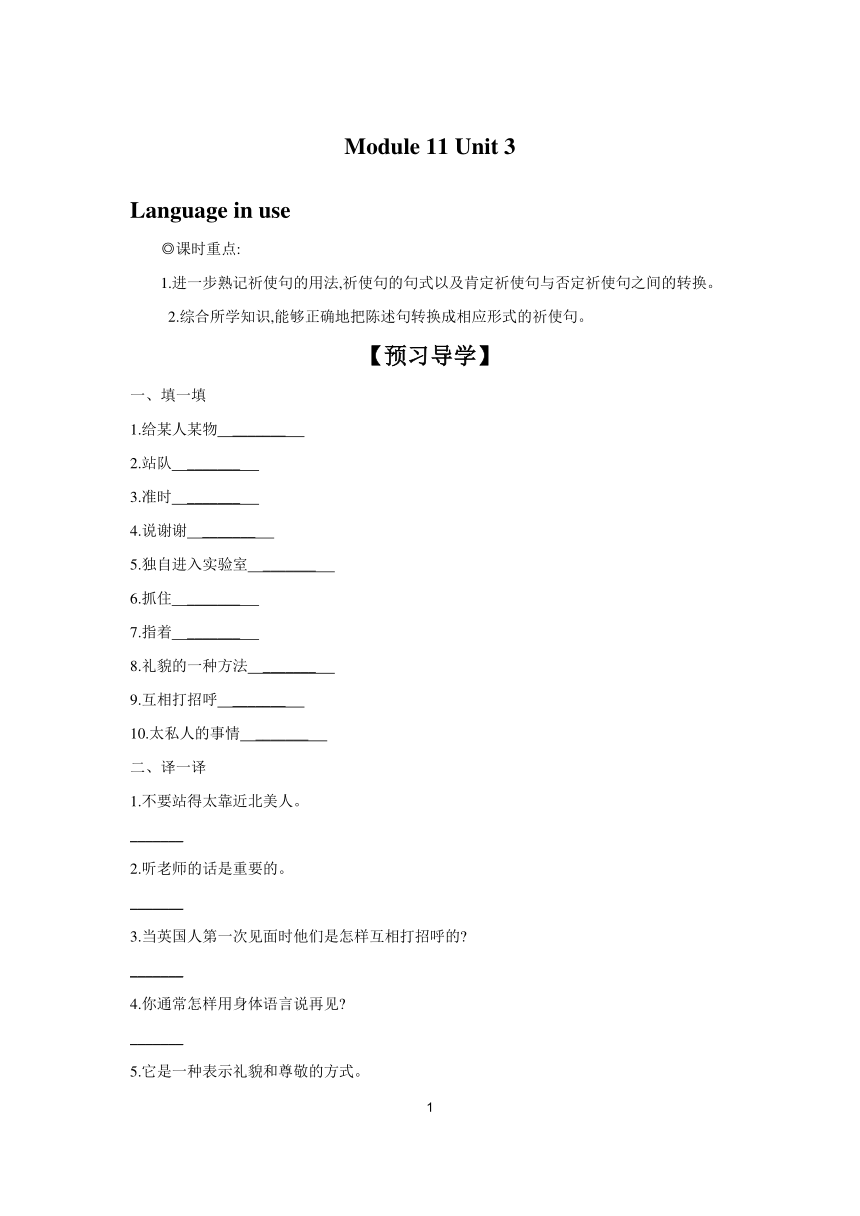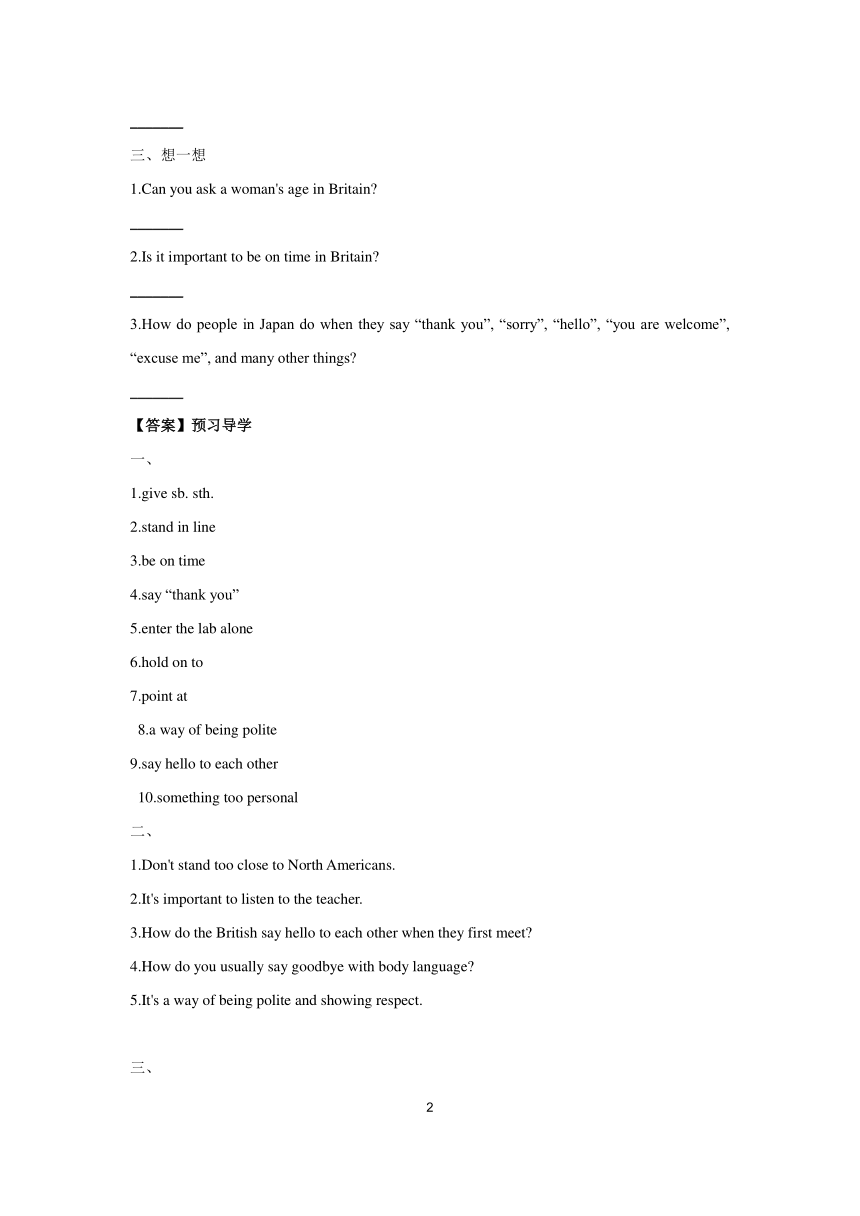Module 11 Body language Unit 3 学案 2023-2024学年初中英语外研版七年级下册(含答案)
文档属性
| 名称 | Module 11 Body language Unit 3 学案 2023-2024学年初中英语外研版七年级下册(含答案) |

|
|
| 格式 | docx | ||
| 文件大小 | 23.4KB | ||
| 资源类型 | 教案 | ||
| 版本资源 | 外研版 | ||
| 科目 | 英语 | ||
| 更新时间 | 2024-02-20 00:00:00 | ||
图片预览


文档简介
Module 11 Unit 3
Language in use
◎课时重点:
1.进一步熟记祈使句的用法,祈使句的句式以及肯定祈使句与否定祈使句之间的转换。
2.综合所学知识,能够正确地把陈述句转换成相应形式的祈使句。
【预习导学】
一、填一填
1.给某人某物 _______
2.站队 _______
3.准时 _______
4.说谢谢 _______
5.独自进入实验室 _______
6.抓住 _______
7.指着 _______
8.礼貌的一种方法 _______
9.互相打招呼 _______
10.太私人的事情 _______
二、译一译
1.不要站得太靠近北美人。
_______
2.听老师的话是重要的。
_______
3.当英国人第一次见面时他们是怎样互相打招呼的
_______
4.你通常怎样用身体语言说再见
_______
5.它是一种表示礼貌和尊敬的方式。
_______
三、想一想
1.Can you ask a woman's age in Britain
_______
2.Is it important to be on time in Britain
_______
3.How do people in Japan do when they say “thank you”, “sorry”, “hello”, “you are welcome”, “excuse me”, and many other things
_______
【答案】预习导学
一、
1.give sb. sth.
2.stand in line
3.be on time
4.say “thank you”
5.enter the lab alone
6.hold on to
7.point at
8.a way of being polite
9.say hello to each other
10.something too personal
二、
1.Don't stand too close to North Americans.
2.It's important to listen to the teacher.
3.How do the British say hello to each other when they first meet
4.How do you usually say goodbye with body language
5.It's a way of being polite and showing respect.
三、
1.No, we can't.
2.Yes, it is.
3.They bow to say “thank you”, “sorry”, “hello”, “you are welcome”, “excuse me”, and many other things.
【合作探究】
任务驱动1
综合练习
1.小组讨论并回答下面的问题。
(1)Is it important to be careful
_______
(2)Can you touch anything if the teacher doesn't ask you to
_______
(3)What can't you bring into the lab
_______
(4)Can you shout in the classroom
_______
(5)Can you enter the lab alone
_______
2.根据课本Around the world,完成下面的句子。
(1)In Japan, people _______ to say “thank you”, “sorry”, “hello”, “you are welcome”, “excuse me”, and many other things.
(2)Children and young people bow _______ when they _______ older people.
(3)It's a way of _______ and _______ respect.
任务驱动2 阅读练习
1.根据课本第3部分的内容,进行句子改写的练习。教师先让学生熟悉所给的例句,然后教师与学生一起改写句子。
完成任务所需的语言结构:
T:It's important to be careful.
S:Be careful.
T:It's important to clean and tidy the lab.
S:Clean and tidy the lab.
...
师生练习完后再让生生练习。
2.根据你的个人情况,回答下面的问题。
(1)Are you polite to your teacher in class
(2)Do you listen to your teacher
(3)Do you bring food or drink into the lab
任务驱动2 对话练习
1.以小组的形式选出正确的问答语,并进行问答练习。 教师将全班同学分为A、B两个小组,对学过的一些礼仪问题进行回答练习。
Group A:
(1)How do the British say hello to each other when they first meet
(2)How do the Russian say hello to each other when they first meet
(3)How do the Japanese say hello to each other when they first meet
(4)How do the Chinese say hello to each other when they first meet
Group B:
a:Shake hands.
b:Kiss three times.
c:Bow to say hello.
d:Shake hands and smile.
【答案】合作探究
任务驱动一 综合练习
1.(1)Yes, it is.
(2)No, we can't.
(3)We can't bring food or drink into the lab.
(4)No, we can't.
(5)No, we can't.
2.(1)bow
(2)lower greet
(3)being polite showing
任务驱动三 听读练习
【知识超市】
●Don't say anything too personal. 不要说太私人的任何事情。
anything是不定代词,我们学过的不定代词还有something, nothing等;too personal 意为“太私人的”, personal 是person 的形容词形式。
需要记住的是形容词修饰不定代词时,形容词需要后置。例如:something new, anything old。
一般情况下,something用于肯定句,anything用于否定句和疑问句。
做一做:单项选择。
( _______)1. Is there in the newspaper
A.something important
B.anything important
C.important something
D.important anything
( _______)2.I have to tell you.
A.something good
B.good something
C.anything good
D.good anything
【答案】知识超市
做一做:
1.B 2.A
2
Language in use
◎课时重点:
1.进一步熟记祈使句的用法,祈使句的句式以及肯定祈使句与否定祈使句之间的转换。
2.综合所学知识,能够正确地把陈述句转换成相应形式的祈使句。
【预习导学】
一、填一填
1.给某人某物 _______
2.站队 _______
3.准时 _______
4.说谢谢 _______
5.独自进入实验室 _______
6.抓住 _______
7.指着 _______
8.礼貌的一种方法 _______
9.互相打招呼 _______
10.太私人的事情 _______
二、译一译
1.不要站得太靠近北美人。
_______
2.听老师的话是重要的。
_______
3.当英国人第一次见面时他们是怎样互相打招呼的
_______
4.你通常怎样用身体语言说再见
_______
5.它是一种表示礼貌和尊敬的方式。
_______
三、想一想
1.Can you ask a woman's age in Britain
_______
2.Is it important to be on time in Britain
_______
3.How do people in Japan do when they say “thank you”, “sorry”, “hello”, “you are welcome”, “excuse me”, and many other things
_______
【答案】预习导学
一、
1.give sb. sth.
2.stand in line
3.be on time
4.say “thank you”
5.enter the lab alone
6.hold on to
7.point at
8.a way of being polite
9.say hello to each other
10.something too personal
二、
1.Don't stand too close to North Americans.
2.It's important to listen to the teacher.
3.How do the British say hello to each other when they first meet
4.How do you usually say goodbye with body language
5.It's a way of being polite and showing respect.
三、
1.No, we can't.
2.Yes, it is.
3.They bow to say “thank you”, “sorry”, “hello”, “you are welcome”, “excuse me”, and many other things.
【合作探究】
任务驱动1
综合练习
1.小组讨论并回答下面的问题。
(1)Is it important to be careful
_______
(2)Can you touch anything if the teacher doesn't ask you to
_______
(3)What can't you bring into the lab
_______
(4)Can you shout in the classroom
_______
(5)Can you enter the lab alone
_______
2.根据课本Around the world,完成下面的句子。
(1)In Japan, people _______ to say “thank you”, “sorry”, “hello”, “you are welcome”, “excuse me”, and many other things.
(2)Children and young people bow _______ when they _______ older people.
(3)It's a way of _______ and _______ respect.
任务驱动2 阅读练习
1.根据课本第3部分的内容,进行句子改写的练习。教师先让学生熟悉所给的例句,然后教师与学生一起改写句子。
完成任务所需的语言结构:
T:It's important to be careful.
S:Be careful.
T:It's important to clean and tidy the lab.
S:Clean and tidy the lab.
...
师生练习完后再让生生练习。
2.根据你的个人情况,回答下面的问题。
(1)Are you polite to your teacher in class
(2)Do you listen to your teacher
(3)Do you bring food or drink into the lab
任务驱动2 对话练习
1.以小组的形式选出正确的问答语,并进行问答练习。 教师将全班同学分为A、B两个小组,对学过的一些礼仪问题进行回答练习。
Group A:
(1)How do the British say hello to each other when they first meet
(2)How do the Russian say hello to each other when they first meet
(3)How do the Japanese say hello to each other when they first meet
(4)How do the Chinese say hello to each other when they first meet
Group B:
a:Shake hands.
b:Kiss three times.
c:Bow to say hello.
d:Shake hands and smile.
【答案】合作探究
任务驱动一 综合练习
1.(1)Yes, it is.
(2)No, we can't.
(3)We can't bring food or drink into the lab.
(4)No, we can't.
(5)No, we can't.
2.(1)bow
(2)lower greet
(3)being polite showing
任务驱动三 听读练习
【知识超市】
●Don't say anything too personal. 不要说太私人的任何事情。
anything是不定代词,我们学过的不定代词还有something, nothing等;too personal 意为“太私人的”, personal 是person 的形容词形式。
需要记住的是形容词修饰不定代词时,形容词需要后置。例如:something new, anything old。
一般情况下,something用于肯定句,anything用于否定句和疑问句。
做一做:单项选择。
( _______)1. Is there in the newspaper
A.something important
B.anything important
C.important something
D.important anything
( _______)2.I have to tell you.
A.something good
B.good something
C.anything good
D.good anything
【答案】知识超市
做一做:
1.B 2.A
2
同课章节目录
- Module 1 Lost and found
- Unit 1 Whose bag is this?
- Unit 2 Are they yours?
- Unit 3 Language in use
- Module 2 What can you do ?
- Unit 1 I can play the piano
- Unit 2 I can run really fast
- Unit 3 Language in use
- Module 3 Making plans
- Unit 1 What are you going to do at the weekends?
- Unit 2 We're going to cheer the players.
- Unit 3 Language in use
- Module 4 Life in the future
- Unit 1 Everyone will study at home
- Unit 2 Every family will have a small plane.
- Unit 3 Language in use
- Module 5 Shopping
- Unit 1 What can I do for you?
- Unit 2 You can buy everything on the Internet
- Unit 3 Language in use
- Module 6 Around town
- Unit 1 Could you tell me how to get to the Nationa
- Unit 2 The London Eye is on your right.
- Unit 3 Language in use
- Revision module A
- Module 7 My past life
- Unit 1 I was born in a small village.
- Unit 2 I was born in Quincy.
- Unit 3 Language in use
- Module 8 Story time
- Unit 1 Once upon a time….
- Unit 2 Goldilocks hurried out of the house.
- Unit 3 Language in use
- Module 9 Life history
- Unit 1 He left school and began work at the age of
- Unit 2 He decided to be an actor.
- Unit 3 Language in use
- Module 10 A holiday journey
- Unit 1 What did you do?
- Unit 2 This morning we took a walk.
- Unit 3 Language in use
- Module 11 Body language
- Unit 1 They touch noses!
- Unit 2 Here are some ways to welcome them.
- Unit 3 Language in use
- Module 12 Western music
- Unit 1 It's so beautiful!
- Unit 2 Vienna is the centre of European classical
- Unit 3 Language in use
- Revision module B
